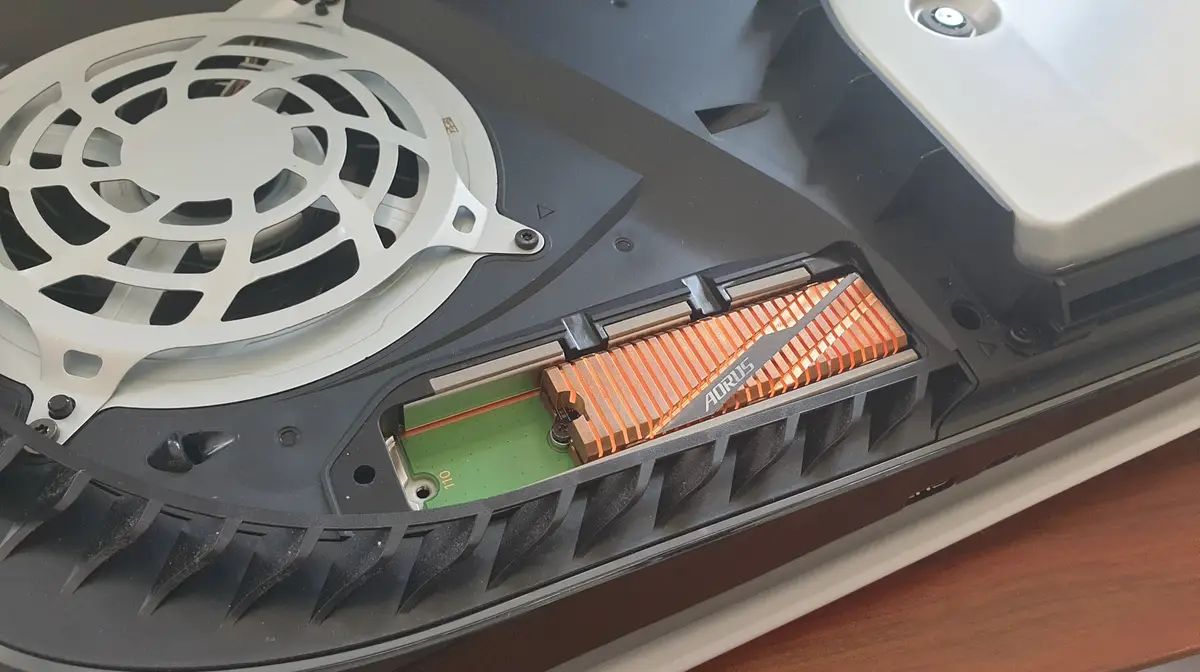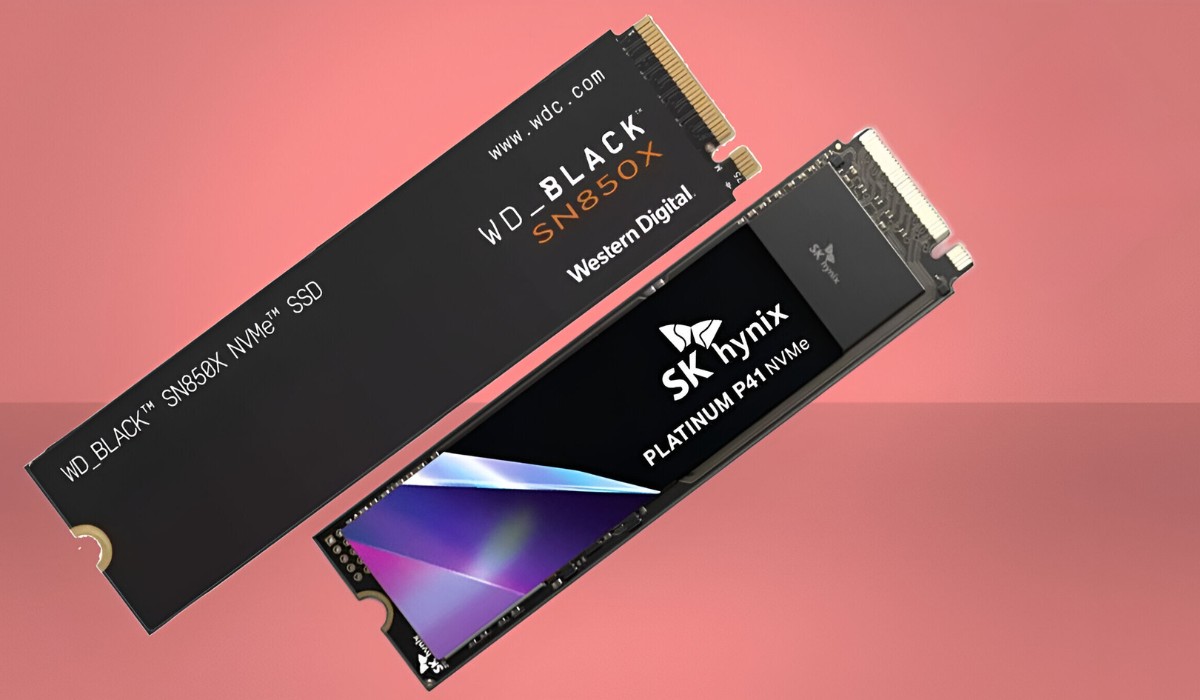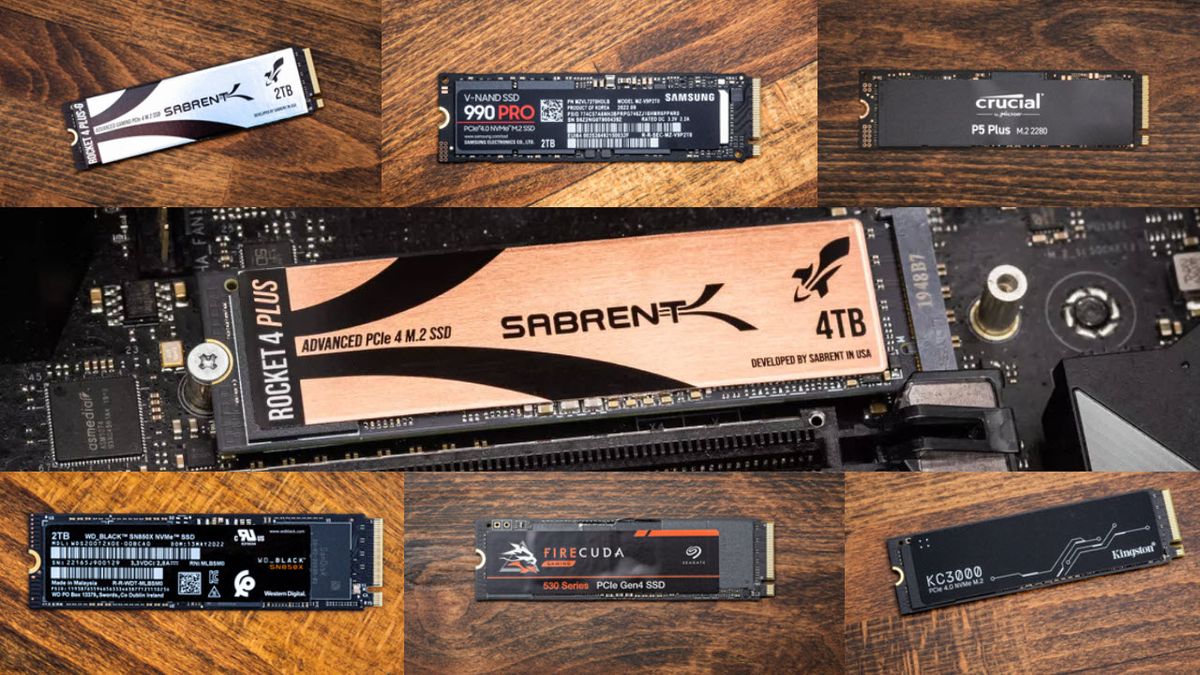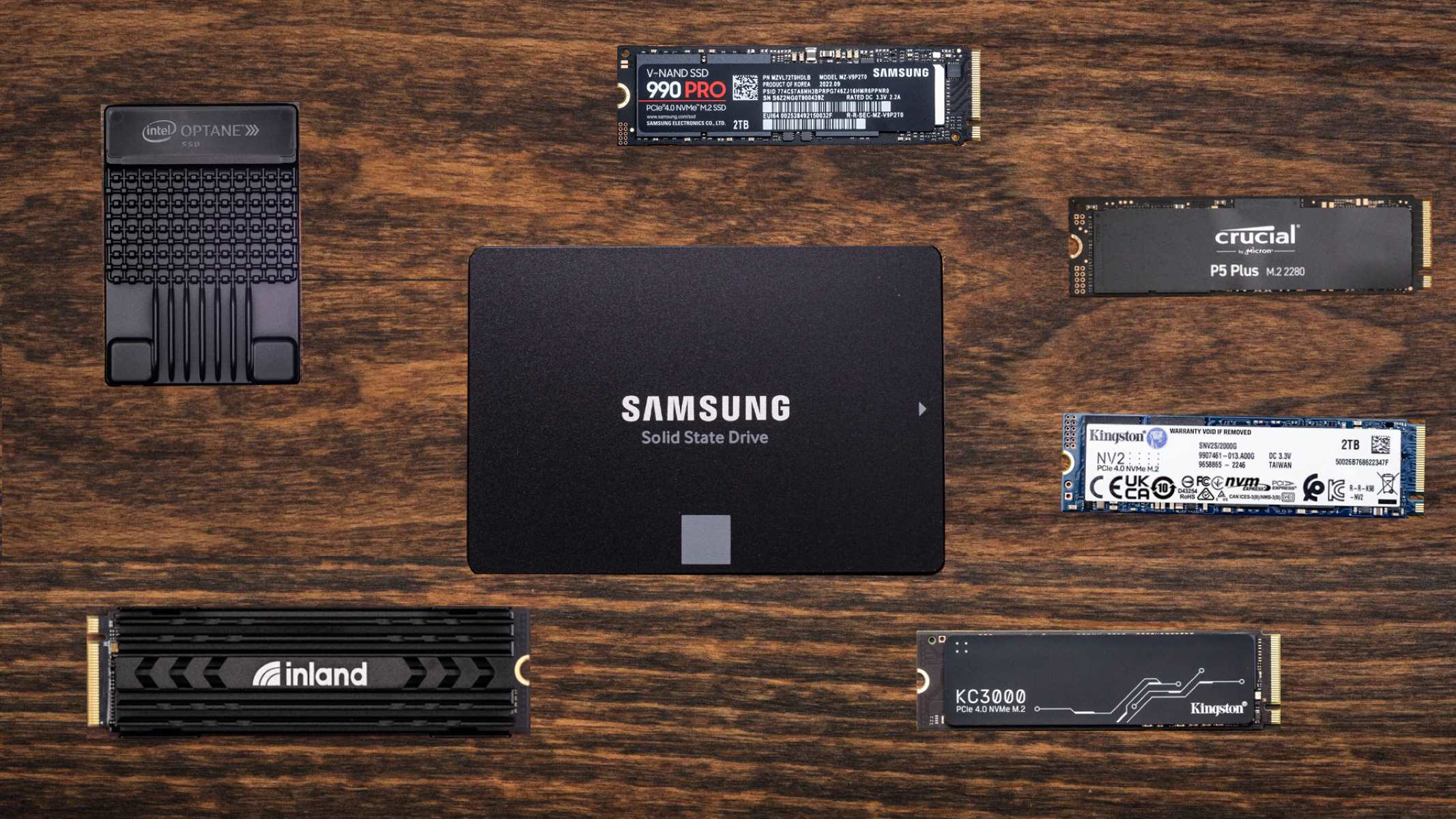Introduction
Welcome to the world of solid-state drives (SSDs)! In this digital era, where storage requirements are growing exponentially, the demand for high-capacity storage devices is greater than ever before. If you find yourself in need of a storage solution that offers both speed and ample space, then the 1TB SSD might be the perfect choice for you.
SSDs have revolutionized the way we store and access data. Unlike traditional hard disk drives (HDDs), which rely on spinning platters and mechanical read/write heads, SSDs utilize flash memory to store and retrieve data quickly and efficiently. This cutting-edge technology has rapidly gained popularity among enthusiasts, professionals, and everyday users alike.
In this article, we will delve into the world of 1TB SSDs and explore their benefits, cost considerations, popular brands, and factors to consider when purchasing one. Whether you’re a gamer looking to upgrade your gaming rig, a content creator seeking faster rendering times, or a regular user requiring additional storage space for your photos, videos, and files, this guide will provide you with essential information to make an informed decision.
Throughout the article, we will explore the price range of 1TB SSDs, the factors that can significantly impact their cost, and the top brands offering these storage devices. We will also share some key factors to consider when buying a 1TB SSD to ensure that it meets your specific needs and requirements.
So, if you’re ready to take your storage experience to a whole new level, let’s dive into the fascinating world of 1TB SSDs and discover the perfect one for you!
What is 1TB SSD?
A 1TB SSD, also known as a 1 terabyte solid-state drive, is a high-capacity storage device that offers an impressive 1 terabyte of storage space in a compact and durable form factor. With this significant storage capacity, a 1TB SSD can accommodate a vast amount of data, ranging from operating systems and applications to multimedia files and documents.
Unlike traditional hard disk drives (HDDs), 1TB SSDs utilize solid-state technology to store and retrieve data. This means that there are no moving parts involved, resulting in lightning-fast access times and improved overall performance. The absence of mechanical components also makes SSDs more resistant to shock and vibrations, making them ideal for laptops and portable devices.
1TB SSDs are built using NAND flash memory chips, which store data electronically. These chips are organized into memory cells, where the data is written and read digitally. The use of flash memory technology not only allows for faster data transfer speeds but also reduces power consumption and enhances the lifespan of the drive compared to traditional HDDs.
One significant advantage of a 1TB SSD is its speed. With read and write speeds significantly faster than those of HDDs, SSDs provide quick access to data, resulting in reduced boot times, faster file transfers, and improved overall system performance. This speed is particularly crucial for demanding applications such as video editing, gaming, and data analysis, where large files need to be processed and accessed quickly.
Additionally, 1TB SSDs offer a compact and lightweight design, making them easy to install and integrate into various devices, ranging from desktop computers and laptops to gaming consoles and external storage solutions. Their slim profile and lack of noisy mechanical components also contribute to a quieter and more pleasant computing experience.
In summary, a 1TB SSD is a high-capacity storage device that provides fast access to data, improved system performance, and enhanced durability. Whether you’re a professional in need of reliable storage for demanding applications or an individual looking to upgrade your storage capacity, a 1TB SSD is an excellent choice that combines ample space with cutting-edge technology.
Why choose SSD over HDD?
When it comes to storage options, both solid-state drives (SSDs) and hard disk drives (HDDs) have their merits. However, there are several compelling reasons why choosing an SSD over an HDD can be advantageous for many users.
The primary advantage of SSDs lies in their remarkable speed. Unlike HDDs, which rely on spinning disks and mechanical read/write heads, SSDs utilize flash memory chips to store and retrieve data electronically. This means that data can be accessed and transferred at lightning-fast speeds, resulting in significantly reduced boot times, faster file transfers, and improved overall system responsiveness.
Another crucial benefit of SSDs is their durability. Since SSDs have no moving parts, they are more resistant to shock, vibration, and accidental drops. This makes them an excellent choice for laptops and portable devices, as they are less likely to experience damage from everyday wear and tear. Furthermore, SSDs also consume less power compared to HDDs, resulting in improved battery life for laptops and reduced energy consumption for desktop systems.
SSDs excel in reliability as well. With no moving mechanical parts, there is a lower risk of mechanical failure, making SSDs more reliable and less prone to data loss. This is particularly important for users who store valuable or irreplaceable data, such as business files, creative projects, or personal photographs. By opting for an SSD, users can have peace of mind knowing that their data is safer and less susceptible to loss or corruption.
Noise reduction is yet another advantage of SSDs. Unlike HDDs, which generate noise through the spinning of their disks and the movements of their read/write heads, SSDs operate silently. This can greatly enhance the overall user experience, creating a quieter and more enjoyable computing environment. Additionally, the absence of moving parts in SSDs leads to less heat generation, resulting in a cooler system overall.
Lastly, SSDs offer a more compact and lightweight form factor compared to their HDD counterparts. This makes them ideal for slim laptops, small form-factor PCs, and other space-constrained systems. Additionally, the smaller size and reduced weight of SSDs make them highly portable, allowing users to easily carry their data and applications wherever they go.
In summary, choosing an SSD over an HDD provides numerous advantages, including faster speeds, improved durability, enhanced reliability, reduced noise, lower power consumption, and a smaller form factor. Whether you’re a professional needing high-performance storage or a casual user looking to boost your system’s speed and efficiency, SSDs offer a compelling solution for all your storage needs.
Factors Affecting the Price of 1TB SSD
When considering the purchase of a 1TB SSD, understanding the factors that influence its price is essential to make an informed decision. Several key factors contribute to the cost of a 1TB SSD, and being aware of these factors can help you determine the best value for your money.
One of the primary factors that affects the price of a 1TB SSD is the NAND flash memory technology used. SSDs employ different types of NAND flash memory, including Single-Level Cell (SLC), Multi-Level Cell (MLC), and Triple-Level Cell (TLC). Generally, SLC-based SSDs are the most expensive due to their higher performance and durability compared to MLC and TLC. As the technology advances and becomes more refined, the cost of manufacturing SSDs with newer types of NAND flash memory tends to decrease, making them more affordable for consumers.
The controller chip is another critical component that impacts the SSD’s price. The controller chip is responsible for managing data flow, error correction, and maximizing overall performance. SSDs with high-end controller chips tend to be more expensive but offer faster speeds and better reliability.
The read and write speeds of a 1TB SSD can also affect its price. SSDs with faster transfer rates and lower latency are generally more costly due to their superior performance. If you require high-speed data access, such as for gaming or professional applications, investing in an SSD with faster speeds may be worth the higher price.
The type of interface supported by the SSD is another contributing factor. SATA (Serial Advanced Technology Attachment) SSDs are typically more affordable, as they utilize the widely supported SATA interface. On the other hand, NVMe (Non-Volatile Memory Express) SSDs, which use the PCIe (Peripheral Component Interconnect Express) interface, offer significantly faster speeds but tend to be more expensive due to their advanced technology.
The overall build quality and brand reputation can also influence the price of a 1TB SSD. Established and reputable brands often command higher prices, as they provide a track record of reliability and customer satisfaction. These brands also tend to invest in research and development, resulting in technologically advanced SSDs that may come with a premium price tag.
In summary, when considering the price of a 1TB SSD, factors such as the type of NAND flash memory, controller chip quality, read/write speeds, interface type, and brand reputation all play significant roles. While price is an important consideration, it’s essential to balance it with the features and performance that best suit your specific needs. By understanding these factors, you can make an informed decision and select a 1TB SSD that offers the right balance of performance, reliability, and value for your storage needs.
Price Range of 1TB SSDs
The price range of 1TB SSDs can vary considerably based on several factors, including brand, performance, technology, and additional features. While it’s important to note that prices fluctuate over time due to market conditions, competition, and technological advancements, we can provide a general overview of the price range you can expect when purchasing a 1TB SSD.
At the lower end of the price spectrum, you can find budget-friendly 1TB SSDs starting at around $80 to $100. These SSDs typically offer entry-level performance and may have slower read and write speeds compared to higher-end models. While they may not have all the bells and whistles of more expensive options, they still provide a significant upgrade in speed and reliability compared to traditional hard drives.
Moving up the price range, you’ll find mid-range 1TB SSDs priced between $100 and $150. These SSDs often offer a balance between performance, durability, and cost. They typically have faster read and write speeds, better endurance, and reliable controller chips. Mid-range SSDs are a popular choice for gamers, content creators, and professionals who require a more robust storage solution without breaking the bank.
For those seeking top-of-the-line performance and cutting-edge technology, premium 1TB SSDs can range from $150 to $300 or more. These SSDs often feature the latest NAND flash memory technology, high-quality controller chips, and faster data transfer speeds. Additionally, premium SSDs may come with advanced features such as hardware encryption, enhanced durability, and longer warranties. They are ideal for power users, enthusiasts, and professionals who demand the utmost speed, performance, and reliability from their storage devices.
It’s worth noting that prices can also vary depending on whether the SSD uses the more common SATA interface or the newer NVMe interface. NVMe SSDs tend to be more expensive due to their superior speeds and performance capabilities. However, as technology advances and economies of scale come into play, the price difference between SATA and NVMe SSDs is becoming less pronounced.
Lastly, promotional discounts, sales, and special offers can significantly impact the price range of 1TB SSDs. It’s always a good idea to check for deals and compare prices across various retailers to get the best value for your money.
In summary, the price range of 1TB SSDs can start from around $80 for budget options, range from $100 to $150 for mid-range choices, and go up to $300 or more for premium models. The specific price you’ll encounter depends on the brand, performance, technology, and additional features of the SSD. It’s important to consider your needs, budget, and priorities when selecting a 1TB SSD to ensure you find the right balance between price and performance.
Popular Brands Offering 1TB SSDs
When it comes to choosing a 1TB SSD, there are several reputable and well-known brands that offer reliable storage solutions. These brands have earned their reputation through a combination of quality, performance, and customer satisfaction. Here are some of the popular brands to consider when looking for a 1TB SSD.
1. Samsung: Samsung is a leader in the SSD market, known for its high-performance and reliable solid-state drives. Their SSDs feature cutting-edge technology, such as their V-NAND flash memory and robust controller chips. Samsung SSDs offer excellent speeds, endurance, and overall performance, making them a top choice for both casual users and professionals.
2. Western Digital: Western Digital is a trusted name in the storage industry, offering a wide range of storage solutions, including SSDs. Their 1TB SSDs provide a balance between performance and affordability. Western Digital SSDs often feature advanced technologies like 3D NAND flash memory and efficient power consumption, delivering reliable and high-speed storage for various applications.
3. Kingston: Kingston is renowned for its quality storage products, and their 1TB SSDs are no exception. With a focus on affordability and performance, Kingston SSDs offer a reliable solution for users looking to upgrade their storage capacity without breaking the bank. Kingston SSDs often boast fast read and write speeds, durable designs, and solid performance for everyday computing tasks.
4. Crucial: Crucial, a brand owned by Micron Technology, offers a range of high-performance and reliable SSDs. Their 1TB SSDs provide excellent value for money, combining fast speeds, durability, and efficient power consumption. Crucial SSDs are popular among gamers, content creators, and anyone looking for an SSD that delivers consistent performance and reliability.
5. SanDisk: SanDisk, now part of Western Digital, is a well-established brand known for its reliable storage solutions. Their 1TB SSDs offer a balance of performance and affordability, making them an attractive choice for many users. SanDisk SSDs often feature impressive read and write speeds, efficient power management, and sturdy build quality.
6. Corsair: Corsair is renowned for its high-performance PC components, including SSDs. Their 1TB SSDs excel in both speed and reliability, making them popular among gamers and professional users. Corsair SSDs utilize advanced technologies such as 3D NAND flash memory and reliable controller chips to deliver fast and consistent performance.
It’s important to note that these brands are just a selection of the many reputable manufacturers in the market, and there are other established names worth considering, such as Intel, Toshiba, and Adata. Ultimately, when choosing a 1TB SSD, it’s important to assess the specific features, performance, and value offered by each brand to find the best fit for your storage needs.
Factors to Consider When Buying a 1TB SSD
When purchasing a 1TB SSD, there are several important factors to consider to ensure that you select the right storage solution for your needs. Taking these factors into account will help you make an informed decision and find an SSD that offers the best performance, reliability, and value. Here are some key factors to consider when buying a 1TB SSD:
1. Performance: Look for an SSD with fast read and write speeds to ensure quick data access and file transfers. Consider the type of NAND flash memory, controller chip quality, and interface technology (SATA or NVMe) to determine the SSD’s overall performance capabilities.
2. Warranty and Endurance: Check the warranty period offered by the manufacturer, as it reflects their confidence in the product’s reliability. Also, consider the endurance rating, which indicates how many terabytes of data can be written to the SSD before it may start experiencing issues.
3. Price and Value: Determine your budget and weigh it against the features, performance, and reputation of the SSD brand. Consider the overall value of the SSD, taking into account its price, reliability, and performance to ensure you get the best bang for your buck.
4. Durability: Assess the SSD’s durability, especially if you plan on using it in a portable device or if you work in environments that may expose the SSD to physical stress or vibrations. Look for SSDs with shock-resistant features or features that enhance durability.
5. Compatibility: Ensure that the SSD you choose is compatible with your system’s interface and operating system. If you have a newer system, consider an NVMe SSD for faster speeds, while SATA SSDs are suitable for most systems.
6. Brand Reputation: Research and consider the brand’s reputation for quality, reliability, and customer support. Established and reputable brands often provide more consistent performance and offer better customer service and technical support if any issues arise.
7. Reviews and User Feedback: Read reviews and user feedback to gain insights into the real-world performance and reliability of the SSD you are considering. Pay attention to any recurring issues or positive experiences mentioned by other users.
8. Power Consumption: If battery life is crucial, consider an SSD with low power consumption to maximize your device’s uptime. Look for SSDs with features such as power management options or low standby power requirements.
9. Additional Features: Consider any additional features that may be crucial for your specific needs, such as data encryption, built-in error correction, or software utilities provided by the manufacturer.
By carefully considering these factors, you can confidently choose a 1TB SSD that meets your performance requirements, offers reliability, and provides good value for your investment. Remember to prioritize the features that matter most to your specific use case, whether it’s high-speed performance, durability, or power efficiency.
Conclusion
In conclusion, the 1TB solid-state drive (SSD) offers a powerful storage solution for users in need of ample space and lightning-fast performance. With its impressive storage capacity, compact design, and efficient use of solid-state technology, the 1TB SSD has become a popular choice for individuals and professionals alike.
Throughout this guide, we explored the benefits of choosing an SSD over a traditional hard disk drive (HDD). We discussed the speed, durability, reliability, noise reduction, and compactness that SSDs provide, making them a superior choice for storing and accessing data.
Furthermore, we examined the factors that affect the price of 1TB SSDs. From the type of NAND flash memory and controller chip used to the read and write speeds, these factors influence the cost of an SSD and determine its performance capabilities.
We also highlighted popular brands that offer high-quality 1TB SSDs, such as Samsung, Western Digital, Kingston, Crucial, SanDisk, and Corsair. These brands have established reputations for reliability and performance, providing users with a wide range of options to choose from.
Additionally, we discussed the factors to consider when purchasing a 1TB SSD. From performance and warranty to price and compatibility, these factors help users make well-informed decisions based on their specific needs and budget.
In conclusion, investing in a 1TB SSD is a worthwhile choice for anyone seeking a reliable and high-performance storage solution. Whether you’re a gamer, content creator, professional, or simply require additional storage space, the 1TB SSD offers the speed, durability, and storage capacity to meet your demands.
It’s important to evaluate the different options available, compare prices, read reviews, and consider the factors discussed in this guide to find the perfect 1TB SSD for your requirements. By taking the time to make a well-informed decision, you can enjoy the benefits that come with the exceptional speed and efficiency of an SSD.

























